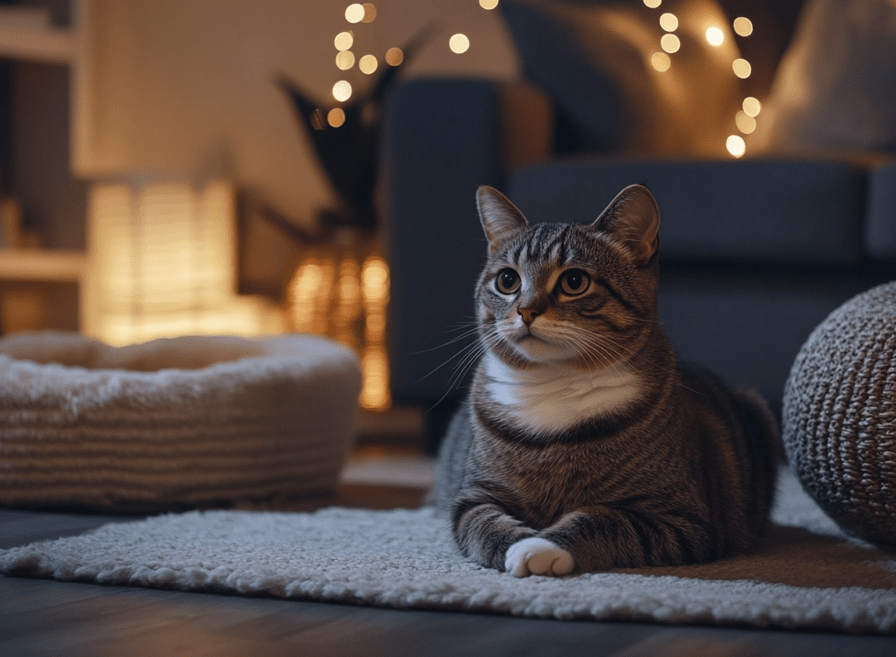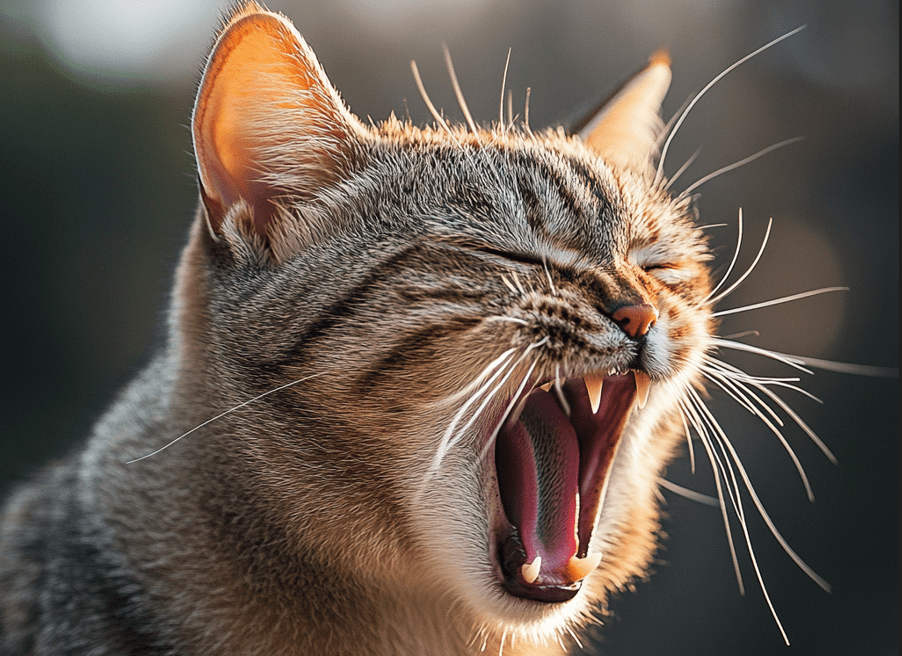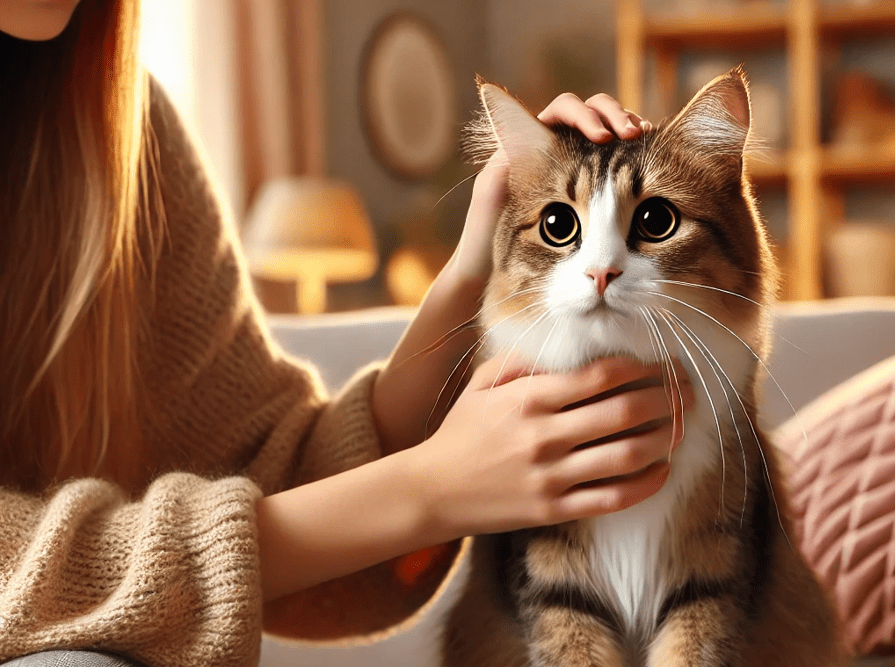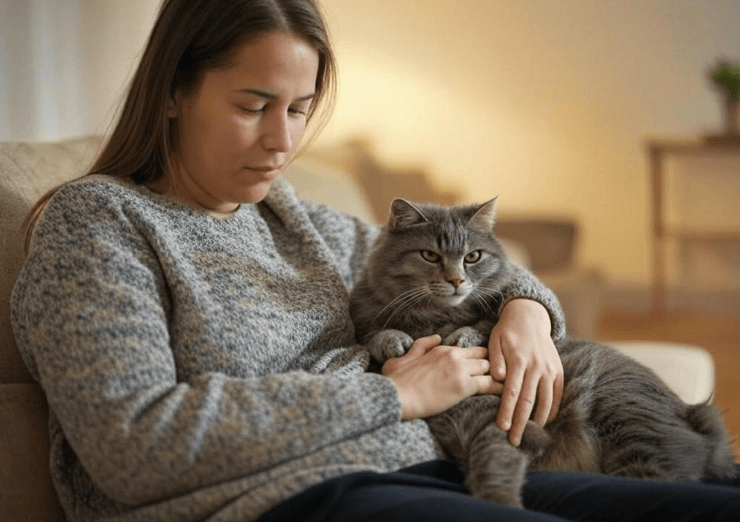
You can see signs of emotional stress in your cat as the owner. Disturbances to your cat’s emotional state through separation anxiety or phobias of loud noises make its full health more affected. When therapy and training fail to treat anxiety in cats doctors will propose medicine to control these conditions. Using anxiety medication in cats may produce side effects that you need to monitor and handle effectively. Sometimes cat anxiety medication side effects may cause serious health issues. It is essential to understand the medication side effects to help your pet maintain good health
Our guide will examine the possible side effects of cat anxiety drugs and show you how to spot when these reactions occur while presenting ways to handle them. Our objective is to provide you with essential information for choosing cat treatment methods that address mental health conditions.
Overview:
1.What is Cat Anxiety Medication?
2.Common Cat Anxiety Medications and Their Side Effects
3.How to Recognize Cat Anxiety Medication Side Effects
4.You Can Monitor Side Effect Risks of Cat Anti-Anxiety Medicine
5.Natural Alternatives to Medication for Cat Anxiety
6.When to Seek Veterinary Assistance
What is Cat Anxiety Medication?
Here veterinarians prescribe anxiety medication to control symptoms of feline anxiety in pets. Similar to how people take medicines to deal with mental health issues, cats require anxiety-specific medication. Veterinarians prescribe these medications to manage fear reactions in cats and to address symptoms from anxiety caused by different circumstances.
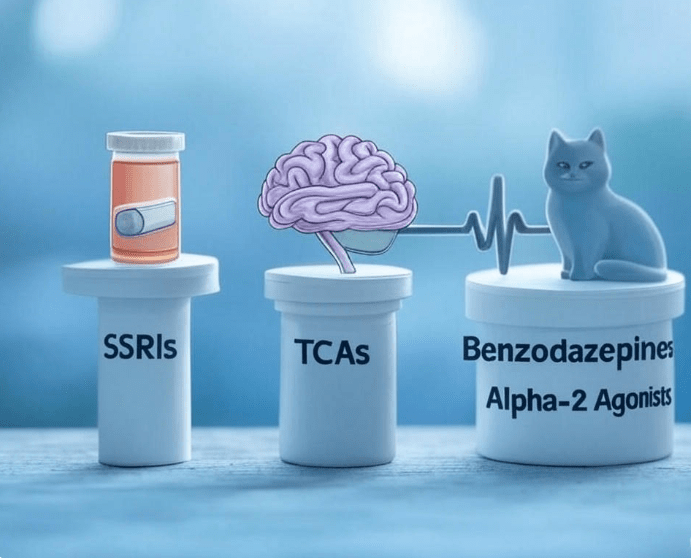
Doctors use different medication groups to treat anxiety in cats which include:
Antidepressants (SSRIs and TCAs): Doctors usually prescribe cats SSRIs and TCAs as treatment options for anxiety control. Medicines work in the brain by modifying neurotransmitter amounts to improve calmness and lessen anxiety.
Benzodiazepines: The medicine benzodiazepines relaxes anxiety by controlling the central nervous system. Doctors use these drugs to manage temporary stress periods in their patients.
Alpha-2 Agonists: Alpha-2 Agonists help reduce stress by turning into sedatives that calm feline anxiety during stressful times.
Prescribed anxiety medicines help lessen feline stress points but they might trigger side consequences in animals. Recognising medication side effects in feline patients is crucial because they can impact the cat’s health in minor or major ways that may persist.
Common Cat Anxiety Medications and Their Side Effects
Every kind of anxiety medication for cats has specific health problems that could affect the pet. The following medications work best to treat anxiety in cats but also create these possible reactions:

Fluoxetine (Prozac)
Fluoxetine as an SSRI medication helps control serotonin imbalances in a cat’s brain by treating anxiety disorders. Cats often take this medicine to control anxiety from separation and other anxiety-based health issues.
Common Side Effects:
Gastrointestinal issues: Cats who take fluoxetine may develop vomiting and diarrhoea while losing appetite. The cat’s body takes time to adjust to the drug so these side effects occur but go away within days.
Restlessness or agitation: A few cats experience increased nervousness because their condition still needs to heal. If these effects continue to bother the cat we need to decrease the medication’s dosage.
Drowsiness: Although fluoxetine serves to ease anxiety in cats it may make them sleepy instead. Very few cats experience too much sedation from this medicine which makes them less active or clumsy.
Clomipramine (Anafranil)
Doctors treat cat anxiety disorders with Clomipramine as an antidepressant drug. Just like fluoxetine this medication modifies brain serotonin amounts to help anxiety.
Common Side Effects:
Drowsiness: Clomipramine generates sleepiness effects in cats much like fluoxetine when first introduced as medicine.
Gastrointestinal issues: Many cats develop gastrointestinal problems as new treatment starts including vomiting or diarrhoea.
Increased thirst or urination: Some feline patients show abnormal energy in their water consumption and urination signs due to medication’s effects on their kidneys.
Alprazolam (Xanax)
Doctors use benzodiazepine alprazolam to treat feline anxiety on a temporary basis. Prescribed alprazolam helps lower nervous system activity and eases cat anxiety during particular distressing events like thunderstorms and car rides.
Common Side Effects:
Sedation: The main effect of alprazolam is to make cats drowsy. Though alprazolam successfully eases a cat’s anxiety it also makes them unusually tired.
Coordination issues: The sedative impact of this drug causes some cats to move and balance poorly.
Changes in behavior: When cats take this medication their normal actions can shift as they become more aggressive or get confused.
Dexmedetomidine (Sileo)
Vets use dexmedetomidine as an alpha-2 drug to help cats manage their anxiety caused by Thunderstorm phobias. The medicine brings down stress responses when given to animals.
Common Side Effects:
Sedation: Dexmedetomidine produces sleepiness that causes unwanted sleepiness in cats.
Vomiting: When given on an empty stomach some cats experience sickness and throw up their food.
Bradycardia: Bradycardia becomes a problem for cats when dexmedetomidine makes their heart beat slower because doctors must watch the patients closely.
How to Recognize Cat Anxiety Medication Side Effects
Detecting medication side effects in cats at their first signs helps you maintain a safe environment for them. These symptoms show how your cat reacts to anxiety medication treatment.
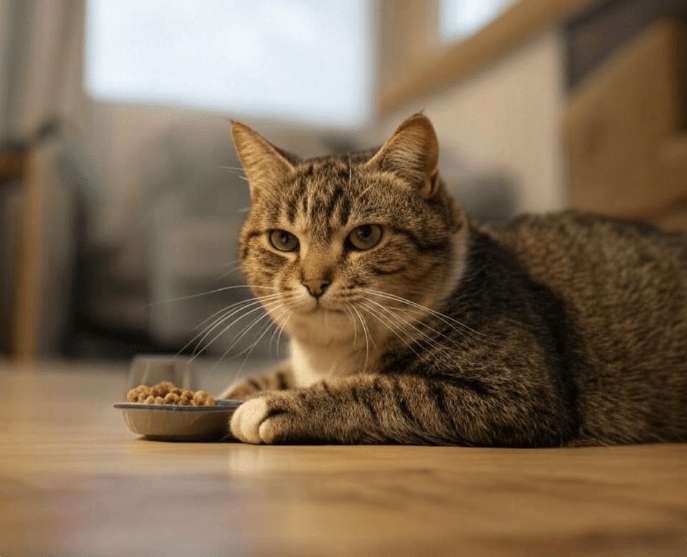
Changes in Behavior: Your cat shows unexpected changes in behaviour when they act more aggressive, restless or lazy due to the medication effects.
Gastrointestinal Issues: Many anxiety medicines cause an upset stomach like throwing up or diarrhoea plus decreased food interest. Talk to your vet about the problem if your cat has these symptoms for long durations or finds them hard to deal with.
Excessive Sedation or Lethargy: Your cat may be too sedated when experiencing extreme sleepiness accompanied by trouble walking and loss of movement control. The problems would put your cat at risk of damage or dirty.
Increased Thirst and Urination: The body may create more urine and make the cat thirsty due to specific medicines which require proper control to prevent dehydration.
Signs of an Allergic Reaction: In rare cases a cat may develop an allergic reaction to any medications. Watch for body swelling that creates breathing problems plus extreme weakness. Take your cat to a vet without delay if they show these problems.
Managing Side Effects of Cat Anxiety Medication
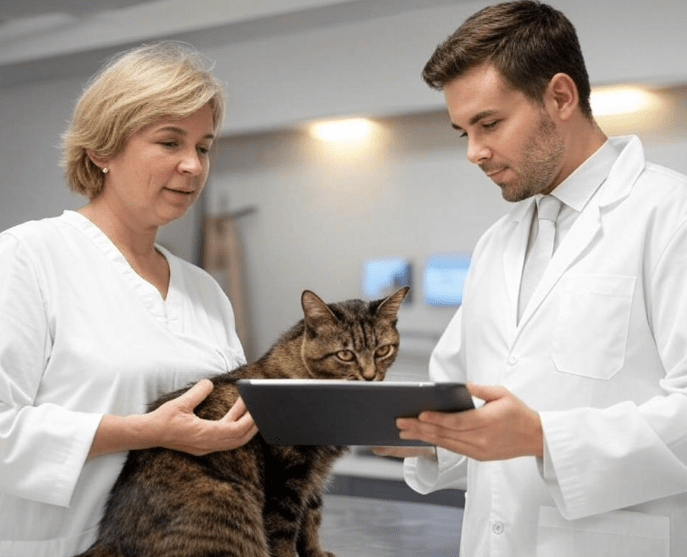
When your cat has problems due to their anxiety medication you need to handle the situation under medical guidance. These steps will assist you in dealing with the issue:
Consult Your Veterinarian: When your cat develops side effects you need to talk to your veterinarian about the matter. The veterinarian needs to make necessary changes between medications or dosages.
Monitor Your Cat Closely: Cheque Your Cat’s Condition Regularly Through Observation and Health Cheques After Medication Starts. Inform your vet about every side effect that concerns you.
Hydration and Nutrition: Offer fresh drinkable water and proper nutrition alongside proper medication to support your cat when they have stomach problems or sedation. Highly trained vets may suggest feeding routines with specific products to reduce medicine side effects.
Consider Reducing Stress: Alongside medicine you should lower any stress factors from your cat’s living space. Set up a comfortable environment for your cat to unwind in and make gradual shifts to their routine to prevent anxiety growth.
Natural Alternatives to Medication for Cat Anxiety
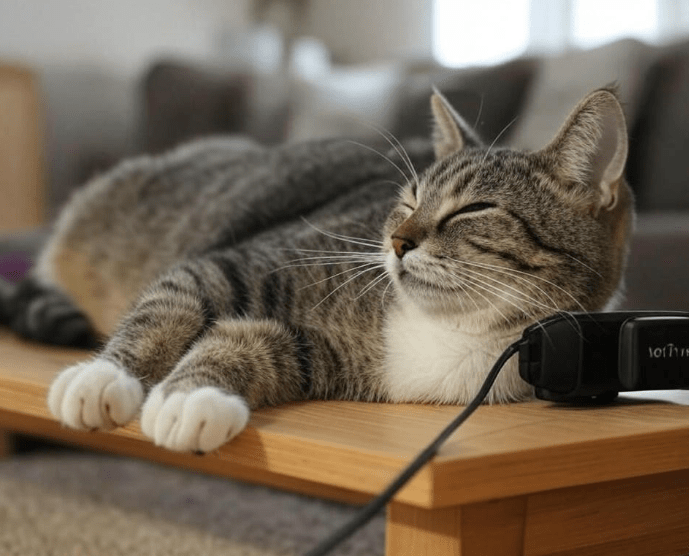
Instead of medication many cat owners would like to use natural treatments to control anxiety. People use these treatments both alongside and instead of prescribed medications for their cats. These three natural solutions help reduce anxiety in cats:
Feliway Diffusers: Natural cat relaxation consists of Feliway Diffusers which reproduce cat-produced calming smells through synthetic pheromones. The product can establish a peaceful space for your kitty.
CBD Oil: Research displays that CBD oil facilitates lowering anxiety symptoms among feline pets. You need to get expert medical advice from your vet before treating your cat with CBD.
Behavioral Therapy: Treatment methods like positive reinforcements through games and gradually exposing your cat to anxiety triggers will ease anxiety both from separation and fear.
Herbal Supplements: Natural plant treatments such as valerian root extracts or chamomile herbal plants help animals relax.
When to Seek Veterinary Assistance
Take your cat to see the vet once the medication side effects do not get better or continue bothering your pet. They will fine-tune treatment by changing drug amounts or switching medicine but will explore more suitable options as well. The situation needs urgent veterinary care if the adverse reaction continues to worsen.
Conclusion

Most animals benefit from anxiety medicines yet owners should monitor their pets for possible drug reactions. You can keep your cat healthy and comfortable by detecting drug side effects early then taking effective steps. Work with your vet to create a proper care plan for your cat while keeping anxiety medication as an essential part of the treatment.

